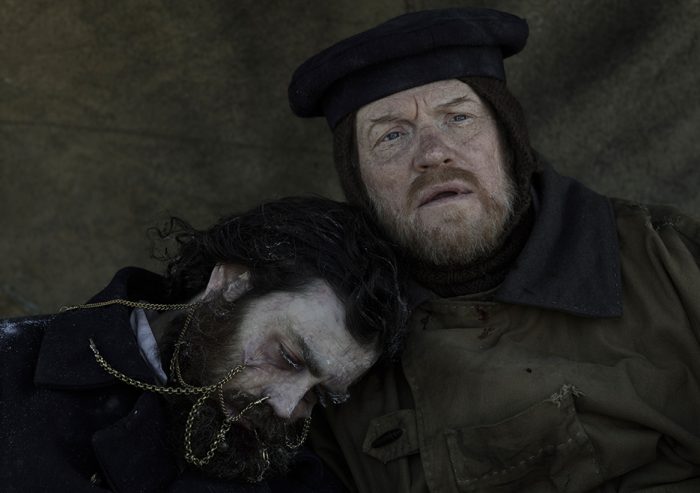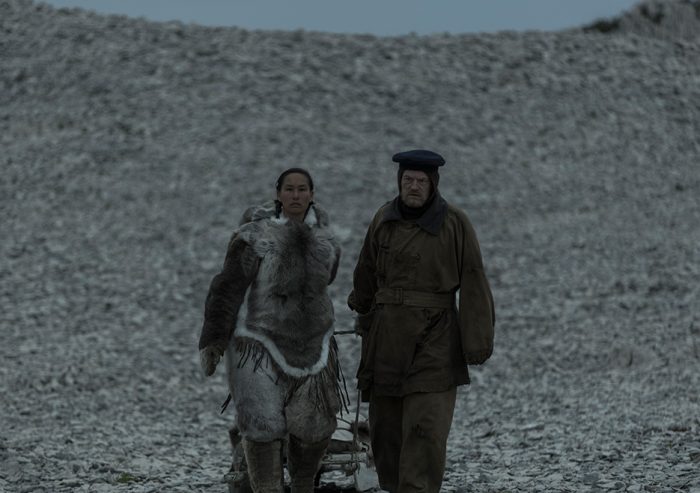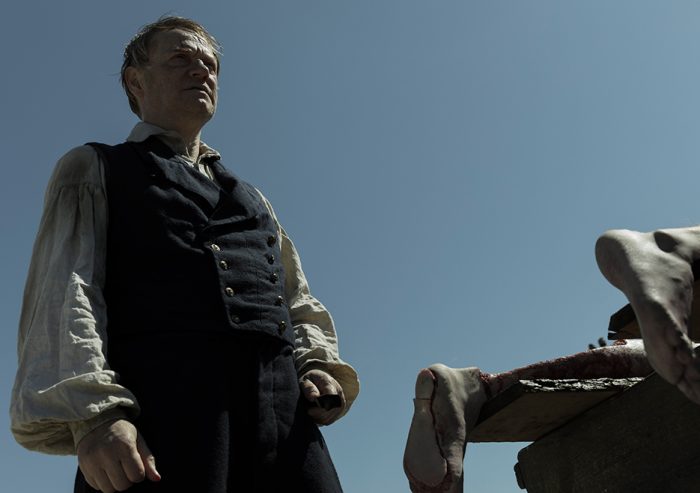'The Terror' Review: 'We Are Gone' Brings The Show To A Haunting End
Parting Words
And here we are, at the end of it all. The long, terrible expedition at the heart of The Terror is at an end, and there are no survivors, save Francis Crozier. We always knew where this story would end up. We knew from the very first moments of the very first episode, when Sir James Ross, leading a rescue mission, spoke with an Inuit man who imparted a ominous final message from Crozier: "We are gone. Dead and gone.""We Are Gone" also happens to be the title of this series finale, and what a succinct title that ends up being. Here, in this final hour, all remaining survivors meet their painful ends, succumbing to starvation, or sickness, or the elements, or even our old friend the Tuunbaq monster.And what are we left with? A prevailing sadness, and a sense that try as we might, we can never stave off the inevitable. Sooner or later, we all must succumb and slip off this mortal coil.If you stuck with The Terror this long, you might find yourself pondering why you devoted so much time to such a downer of a story. Yes, most horror-based entertainment is filled with woe and darkness, but the hopelessness that prevailed throughout The Terror might be too much for many. And yet nestled in all that darkness were rare glimmers of light. And also some magnificent storytelling.Last week's episode found Crozier captured, and now he's a prisoner in Hickey's camp, where things are deteriorating fast. Here, Crozier is reunited with good old Harry Goodsir, who comes to the end of his journey rather quickly. It is a terrible, painful thing to watch, primarily because Paul Ready's performance has been so magnificent, and so sweet through this entire series. Goodsir was a man who lived up to his name, and that he made it this far – to the end of it all – seems both a miracle and a curse.Goodsir makes it clear to Crozier that he will die soon, and he makes a rather strange request to the captain: "When I die, eat my feet – preferably the soles." Crozier is understandably put-off by this, but there's a method in Goodsir's madness. He proceeds to cover his body with poison, ingest even more poison, and then slowly and methodically slit his wrists. Goodsir's final moments are haunting and lovely to the extreme – as his life slips away, he has visions of all sorts of natural wonders. The type of wonders a man of science such as himself might have recorded in a diary.And then he's gone. And his final act is to poison the treacherous lot who have thrown in with Hickey. They'll feast on Goodsir's poisoned corpse, and pay the consequences.Goodsir's demise isn't the only haunting death here. We also watch as Jopson hallucinates dragging his dying body across a banquet table, knocking over delicious looking food, attempting to get to Crozier, who – in the hallucination – sits at the head of the table, oblivious.And then, of course, there's the death of Mr. Hickey. In perhaps the one truly cathartic moment of the episode, Hickey – clearly gone mad to the extreme – has his men (and Crozier) drag him across the wasteland in a rowboat. Hickey rants and raves, like some sort of apocalyptic preacher ready for the end times. Enter the Tuunbaq, which proceeds to tear apart any men in its path. Hickey, madman that he is, thinks he can still get the upper hand. Or upper tongue, in this case. He saws the tongue from his mouth and holds it out to the Tuunbaq, assuming this will somehow appease the beast.It doesn't.Instead, the monster chomps down onto Hickey's arm then bites him in half. No one will mourn Hickey – or whoever he really was. He dies a ranting, raving coward, torn apart by a mythical beast. But Hickey's death does end up serving a purpose: the death of Tuunbaq. Hickey's body has been run through with the poison from eating Goodsir's flesh, and that poison kills Tuunbaq once and for all. The monster dies inches away from the injured Crozier, who watches the life run from the beast's eyes before passing out himself.And who should later rescue Crozier? Why, it's none other than Lady Silence herself. Later, Crozier will finally learn her real name – Silna. It's a simple, yet effective reveal, and one of the few bright moments in this bleak, unforgiven episode.After the rescue, Silna takes Crozier to the camp where he finds the chewed-upon remains of his men. Cannibalism set in not just in Hickey's camp, but his own camp as well. The only man left alive is Little – the same man Crozier ordered to take command and lead the surviving men onward. Obviously, that didn't happen. Instead, Little has – for some reason – pierced his face with gold pocket watch chains, turning himself into some kind of bizarre idol. And then he slips away.And all is lost.There's no hope anymore. No point. Crozier, his wounds nursed by Silna and her people, could, in theory, try to get back home to England now. But what would be the point? And how would he ever face the gazes of the people back home – people pondering how he survived, while the hundreds in his care perished. So instead, Crozier leaves a message with the Inuit for anyone who comes looking for him: "Tell those who come after us not to stay. The ships are gone. There's no way through. No passage. Tell them we are gone. Dead and gone."The final moments of the show are both curious and haunting. Years have passed, and Crozier – older now, and looking tired and run down – sits in the snow, dressed in furs, an Inuit child sleeping by his side. Is it his child? Maybe. The Inuit have taken him in; made them one of their own. He belongs with them now, and yet, as the camera pans out, revealing him to be sitting seemingly in the middle of nowhere – nothing but wide open ice on either side of him – it's clear that he really belongs nowhere. He's gone.
We Are Gone
What an achievement The Terror was. An eerie, scary, heartfelt and almost soul-crushingly sad exploration of death. There's no room for more seasons; no room for more stories. This is a completely contained show, telling one tragic tale, and leaving the audience almost traumatized as a result.Every episode was a masterwork, but tonight's finale, helmed by Tim Mielants, might be the best yet. There are long stretches of silence here – silence that's only alleviated by cold, howling winds that seem to cut right off the screen and into our bones. And there's horror unlike any other other horror show as well.Most modern horror TV shows seem to derive their fear from shock – be it via gore, or jump scares, or things that go bump in the night. The Terror, and tonight's episode in particular, uses dread to its advantage. The dread of inevitability; the dread of eternity; the dread of being certain that one day, we'll all vacate this world, and simply cease to be. Like the men of The Terror, one day we, too, will be gone. And what will be left of us? A few artifacts, collecting dust, handed down again and again until they're forgotten forever – and us along with them.This is incredibly depressing, and I understand that The Terror is not a show for everyone. But I will be forever in awe of how bold this series was, and how committed it was to conveying its horrifying story.
Stray Observations

